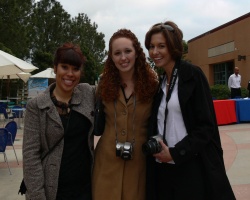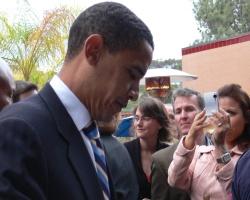Obama’s charisma and relative youth (he’s 45) attracts large numbers of younger voters and generates the kind of media coverage that the nearly 20 other presidential candidates would die for. His bestselling books, like The Audacity of Hope (which was named after one of his pastor’s sermons), have provoked debate among values voters in blue and red states.
Obama, a card-carrying Democrat, is just as comfortable discussing issues of religion and morality as Republicans have been in recent years. Unlike 2004 Democratic candidate John Kerry, who shied away from religion, Obama eagerly talks about how his faith impacts his political values.
Last year we asked four student journalists to investigate Obama-Mania. Here’s their firsthand report.
There we sat at 10 o’clock on a February morning. We had nailed the who, what, when, and why but lacked the crucial where? Three fundraising events scheduled for Sen. Barack Obama were being hosted by the La Jolla Democrat Club at undisclosed locations.
Our attempts to reach him up to this point had been futile, and tickets to the fundraisers cost $250 to $2,500 a person, which is high even for YouthWorker Journal’s luxurious standards.
We really wanted to see the man behind the mania. Obama had been making news for weeks and was a frequently discussed topic on campus, especially as he is a Democrat talking about faith and values.
Thirty minutes before a wine and cheese reception was scheduled to begin, we received a phone call from one of our contacts informing us the event was at the Birch Aquarium in La Jolla. As we approached the entrance, we could see representatives of major media outlets waiting for Obama to arrive.
After a two-hour wait, a beige minivan pulled up. That didn’t draw much attention until Obama stepped out. In a hurry, reporters grabbed their cameras and notebooks and rushed toward the car. Obama walked straight toward the two policemen on duty and shook their hands. We made our way to the front of the crowd. One of us shouted, “Senator Obama, how do you feel your faith will influence your politics?”
“I’m not taking questions right now,” he said.
When the media were instructed to leave the courtyard, we were able to proceed with them into the event. Perhaps our dressy attire and discreet cameras suggested we were with the real reporters!
The room was fairly small, providing an intimate atmosphere. As Obama climbed on stage, he was greeted with cheers. Armed with an audio recorder, notepad, and camera, the four of us situated ourselves throughout the room.
The crowd seemed enthralled with Obama’s magnetism. Media reports about his overwhelming likeability are no myth. Keeping the range of topics simple in his well-crafted speech, Obama’s tone fluctuated between lighthearted and serious. He touched on a variety of issues, including his proposal that American troops withdraw from Iraq by next March.
He also addressed these issues:
Healthcare: “We understand that our healthcare system is broken. I think we have the resources and the wherewithal to create a system where every American has access to affordable and accessible healthcare. There is no reason why we can’t do that.”
Energy policy: “We know that in the absence of an energy policy, not only does it weaken our economy and threaten our national security but it threatens the very well being of our planet.”
The war in Iraq: “There are no good options in Iraq at this point; there are only bad options and worse options. But the worst option is to continue to put our young men and women in the midst of what essentially is a sectarian civil war in which they cannot succeed in their mission.”
The economy: “We’ve got a global economy where our children will not only have to compete not just against young people on the other side of the United States but on the other side of the world in Beijing and Bangalore, and unless we boost their capacity to work at the highest levels of math and science…we are going to have extraordinary problems in making sure our standard of living continues to go up.”
And young people: “We are going to be passing on our world then to our children that is a little meaner, a little less safe, a little poorer than the one that we inherited from our parents. And that’s unacceptable. That’s un-American.”
After he finished his speech, people were cheering and pushing their way to the front to get an autograph from this new political superstar. We left the fundraiser impressed by Obama’s articulate speech, powerful presence, and ability to captivate a crowd.
The four of us even contemplated our own current political affiliations (two of us are registered Republicans) and debated whether or not we are going to vote Republican in 2008. We agreed Obama delivered a message that seems to transcend traditional Republican/Democrat battle lines.
As a member of the United Church of Christ, Obama has frequently discussed the interplay of faith and politics. In his 2006 keynote address at the “Call to Renewal” conference, he said:
Secularists are wrong when they ask believers to leave their religion at the door before entering into the public square. Frederick Douglas, Abraham Lincoln, William Jennings Bryant, Dorothy Day, Martin Luther King—indeed, the majority of great reformers in American history—were not only motivated by faith, but repeatedly used religious language to argue for their cause. So to say that men and women should not inject their ‘personal morality’ into public policy debates is a practical absurdity. Our law is by definition a codification of morality, much of it grounded in the Judeo-Christian tradition.
We’re already deep into the 2008 election cycle, and it’s clear that Republicans no longer have a monopoly on comments about faith in the public square. That—and many other aspects of Barack Obama—will force many Americans to think, reflect, and pray before casting their votes for the next President of the United States.
Where They Stand:
Resources Help Assess Candidates Positions
We still have more than a year to go before the 2008 election, but the campaign season started earlier this time around, and it has already attracted more candidates, more money, and more buzz than many previous presidential campaigns.
But with some 20 candidates vying for attention it’s tough to figure out where they stand on the important issues. The following resources will help you and your kids find out more about the candidates’ positions on the issues that matter most to you.
Religion Politics ’08
This in-depth web site was launched in April by the Pew Forum on Religion and Public Life. The site features profiles of the key candidates along with their positions on these issues of importance to values voters: abortion, church and state: death penalty; education; environment; faith-based initiatives; gay marriage; heath care; immigration; Iraq war; poverty; and stem cell research.
“Religion has already become a major issue in news coverage and discussions about the next presidential election,” says Pew Forum Director Luis Lugo. “Our goal is to provide up-to-date, reliable, and impartial information on religion and the 2008 elections.”
Meet the Press
Launched as a radio show in 1945, “Meet the Press” has covered American politics ever since. Host Tim Russert plans on interviewing all the major candidates, and his hour-long question-and-answer sessions provide some of the most intense questions candidates face. Broadcast on Sunday mornings on NBC and rebroadcast later on cable channel MSNBC, “Meet the Press” also offers netcasts and transcripts of the interviews on its web site.





